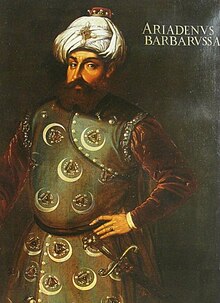This is an old revision of this page, as edited by Per Honor et Gloria (talk | contribs) at 04:11, 17 October 2010 (→Piracy: +). The present address (URL) is a permanent link to this revision, which may differ significantly from the current revision.
Revision as of 04:11, 17 October 2010 by Per Honor et Gloria (talk | contribs) (→Piracy: +)(diff) ← Previous revision | Latest revision (diff) | Newer revision → (diff)The Regency of Algiers was an Ottoman territory centered on Algiers, in modern Algeria. It was established in 1525, when Hayreddin Barbarossa re-captured the city. It roughly covered the area of modern Algeria, between the states of Tunisia and Morocco.
Establishment

The Regency of Algiers was the principal center of Ottoman Empire power in the Maghreb. It was also a base from which attacks were made on European shipping.
Base in the war against Spain
Hayreddin Barbarossa established the military basis of the regency. He left Hasan Agha in command as his deputy when he had to leave for Istanbul in 1533.
The son of Barbarossa, Hasan Pashan was the first governor of the Regency to be directly appointed by the Ottoman Empire in 1544, when his father retired, and took the title of beylerbey.
Beylerbeys continued to be nominated for unlimited tenures until 1587, when the Ottoman Empire set up a regular Ottoman administration in Algiers and its dependencies, headed by Pashas, with 3 year terms. This was a way o considate Ottoman power in the Maghreb, after Spain had sent an embassy to Istanbul in 1578 to negotiate a truce, leading to a formal peace in August 1580. From that point the Regency of Algiers was a formal Ottoman territory, rather than just a military base in the war against Spain.
Piracy


Attacks on Christian, and especially Catholic shipping, with slavery for the captured in what becameknown as the Barbary Slave Trade, became prevalent in Algiers. In the early 16th century, Algiers became with other North African harbours such as Tunis, one of the bases for Anglo-Turkish piracy:
A contemporary letter states:
"The infinity of goods, merchandise jewels and treasure taken by our English pirates daily from Christians and carried to Allarach, Algire and Tunis to the great enriching of Mores and Turks and impoverishing of Christians"
— Contemporary letter sent from Portugal to England.
Piracy and slavery of Christians originating from Algiers were a major problem throughout the centuries, leading to regular punitive expeditions by European powers. Abraham Duquesne fought the Barbary pirates in 1681 and bombarded Algiers between 1682 and 1683, to help Christian captives.

During the early 19th century, the Regency of Algiers resorted to widespread piracy against shipping from Europe and the young United States of America, mainyl due to internal fiscal difficulties. This in turn led to the Barbary Wars, which culminated in August 1816 when Lord Exmouth executed a naval bombardment of Algiers.
French invasion

During the Napoleonic Wars, the Regency of Algiers had greatly benefited from trade in the Mediterranean, and of the massive imports of food by France, largely bought on credit by France. In 1827, Hussein Dey, Algeria's Ottoman ruler, demanded that the French pay a 31-year old debt, contracted in 1799 by purchasing supplies to feed the soldiers of the Napoleonic Campaign in Egypt.
The French consul Pierre Deval refused to give answers satisfactory to the dey, and in an outburst of anger, Hussein Dey touched the consul with his fan. Charles X used this as an excuse to break diplomatic relations. The regency of Algiers would end with the French invasion of Algiers in 1831.
Notes
- ^ A history of the Maghrib in the Islamic period by Jamil M. Abun-Nasr p.151ff
- A history of the Maghrib in the Islamic period by Jamil M. Abun-Nasr p.152ff
- Piracy and the Decline of Venice, 1580-1615 by Alberto Tenenti p.81
- Sick economies: drama, mercantilism, and disease in Shakespeare's England Jonathan Gil Harris p.152ff
- Martin's History of France by Henri Martin, p.522